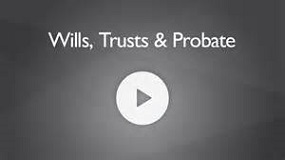The Probate Process
The probate process can many times be a monumental task. First, it concerns the handling of a loved one’s affairs, which in and of itself is no small task. These affairs can range from the seemingly mundane (like handling the safety deposit box) to the downright difficult (how to transfer any retirement accounts or finding digital assets). Because these issues are difficult, it doesn’t make the legal process any easier. The legal process in nearly all states is really based upon certainty. That is, each state wants their residents to known, with certainty, who owns a list of assets that the decedent used to own. This certainty comes at a cost, however. That cost is time and money and difficulty.
Below is a good article on the probate process in New York. Enjoy.
http://www.nycprobate.com/894.html
PROVING A LAST WILL & TESTAMENT
When a person dies leaving a Will, the legal process that takes place is called probate. A Will only needs to be probated if the decedent died with assets valued at $30,000 or more. Before the Will has any legal effect, it must be admitted to probate by the Surrogate’s Court located in the county where the person died. In other words, the court must make a determination that the Will is valid. A valid Will must be properly executed and accurately reflect the wishes of the testator. Remember, a Will that has not been admitted to probate has no effect. It is only after the will is probated that the Executor has authority to act.
In order to be valid, a New York Will must be signed in the presence of at least two witnesses and each must sign in the presence of the other. The person making the will must be competent to do so of his or her own free will, and not under any duress or undue influence.
The probate process is commenced by filing the original Will and a probate petition with the court. After jurisdiction is complete and all issues have been addressed, the court will issue a decree granting probate and issue Letters Testamentary to the Executor or Executors named in the Will. If anyone believes that the Will is not valid, that person may start a Will contest by filing objections to the probate.
Letters Testamentary is a document which gives the Executor the authority to administer the estate. The Executor will be responsible for identifying and inventorying the decedent’s property, having the property appraised, paying debts and taxes and distributing the property as the Will directs. For information on what it means to be an executor, read our Executor’s Guide.
Do I need to probate my relative’s Will?
The Will is required to be probated only when the decedent died possessing assets valued at $30,000 or greater. This does not include assets for which there are designated beneficiaries (e.g., joint accounts, “in-trust-for” accounts or insurance proceeds not payable to the estate). In certain circumstances, when the decedent owned only real estate probate may not be necessary.
Do I need an Attorney to handle my probate matter?
There is no requirement that you hire an attorney to take care of a probate proceeding on your behalf. If you feel comfortable doing so, you may handle a simple probate yourself. However, many probate matters are challenging and you would be better served by having an experienced probate attorney handle your case. Some complications that may arise include difficulty in locating interested parties for jurisdictional purposes, defects in the language of the Will and the potential for someone contesting the Will. Read more about litigated probate matters.
How much does probate cost?
The costs associated with probate proceedings vary greatly dependant on the complexities of each particular case. Legal fees associated with a simple probate will be comparatively modest in comparison to those in a contested probate matter. Probate is regarded as simple where all of the parties are close relatives and all parties are in agreement with the terms of the Will. In addition to legal fees, the Surrogate’s Court charges probate filing fees based upon the value of the gross estate:
LEGAL FEES
In New York, there is no set fee for a probate proceeding so it’s up to the client and the attorney to agree upon a fee. Most attorneys offer three basic types of fee arrangements – hourly, flat fee and percentage. Under an hourly retainer the estate is billed only for the services performed by the law firm. Usually, some of the work is assigned to a paralegal and is billed at a reduced rate. The attorney’s experience, expertise, location and other factors determine hourly rates.
Flat fee arrangements are ordinarily reserved for straightforward matters in which the services required can be clearly delineated. If legal work is required that goes beyond what has been agreed upon, the additional services are normally charged at hourly rates.
Under a percentage fee agreement, the attorney’s fees are equal to a percentage of the value of the estate.
How long does probate take?
A simple probate may take a few weeks depending upon each individual Court schedule. On the other hand, probate can be a lengthy process when there are complications such as in a contested matter. An experienced probate attorney will make sure that the process is completed as quickly as possible.

